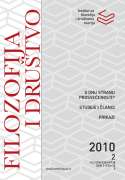Rorti i savremena društvena teorija
Rorty and Contemporary Social Theory
Author(s): Srđan ProdanovićSubject(s): Social Sciences
Published by: Institut za filozofiju i društvenu teoriju
Keywords: communication; abnormal and normal discourse; edification; contingency; postmodernism; liberalism; utopia; social hope.
Summary/Abstract: The aim of this paper is to show certain aspects of Rorty’s philosophy that are relevant to social theory, and also to point out the most important divergences of Rorty’s insights from postmodern understanding of social reality. Therefore, in the first part of the paper I will examine both Rorty’s philosophy of edification and all relevant criticisms to his view of philosophy “as a communication of mankind”. Furthermore, I will try to establish to which extent Rorty’s understanding of contingency and its implications really falls close to postmodern thought. I will also argue that the impossibility of philosophical justification of social reality, according to Rorty, does not entail impossibility of moral progress and that the role of social theory is actually in raising the level of inclusion of social interaction and in providing social hope. Moreover, it will be shown that Rorty, unlike Foucault and Derrida, thought that the institutions of Western democracy and liberalism are quite capable to achieve these goals and that accomplishment of this liberal utopia greatly depends on the degree of commitment to moral progress that all actors (writers, social scientists and philosophers) within the cultural field share.
Journal: Filozofija i društvo
- Issue Year: 21/2010
- Issue No: 2
- Page Range: 97-116
- Page Count: 20
- Language: Serbian

